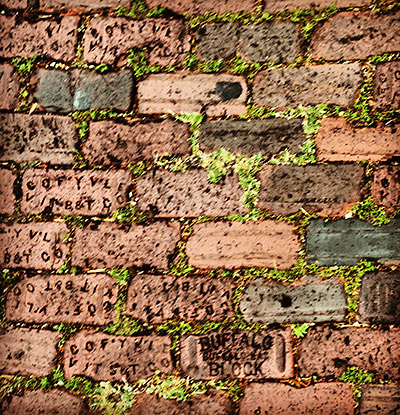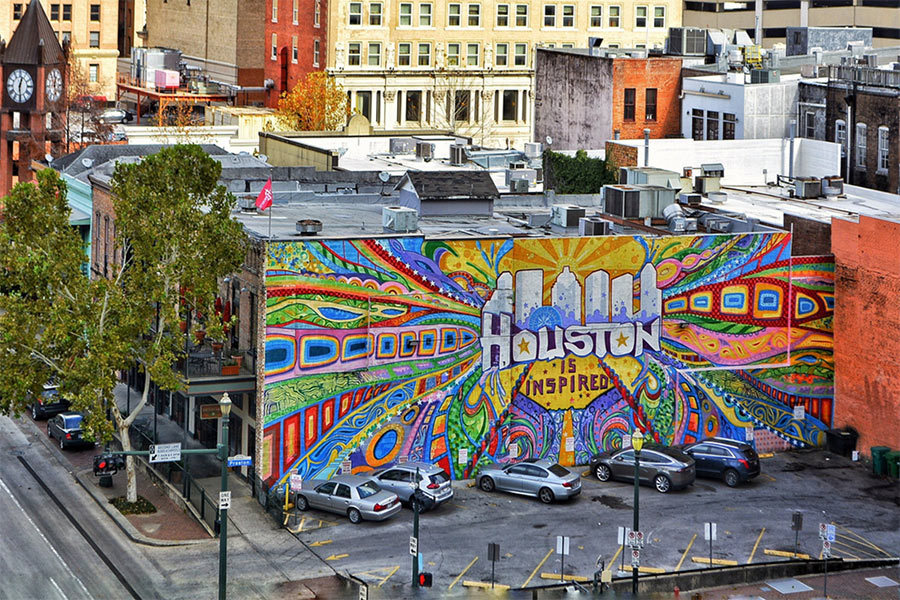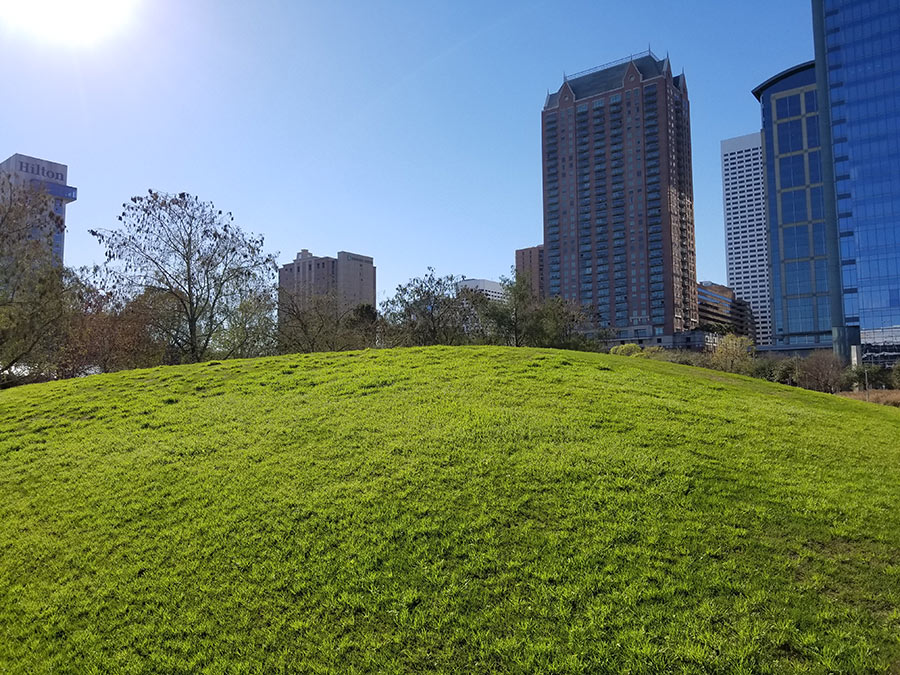
- Government Entities Talk Up Various Plans for Messing with Downtown Warehouse District, Near Northside [Culturemap]
- Aeros Officially Leaving Houston for Des Moines, Transforming into ‘Iowa Wild‘ [HBJ]
- Perry Homes Won’t Quit Building After Founder’s Death [HBJ]
- New ‘Greek Style’ 22-Screen Palladium AVX Theater Opening Next Month on Grand Parkway at West Bellfort Will Include Bowling Alley [Prime Property]
- Montgomery County Food Bank Raising $6.5M To Renovate 60,000SF facility in The Woodlands Trade Center [Courier of Montgomery County]
- Behind Mattress Mack’s Complaints About the Uptown BRT Plan [Off the Kuff]
- North Carolina Wants To Know How Sugar Land Keeps Itself So Clean [Houston Chronicle]
Photo of street bricks, Indiana St. near Commonwealth: Larry Zerante





In my not so humble opinion, Galleria area does not need rail or BRT. I’m in the area on daily basis and have been frequenting it for the last 20 years. The traffic is not as bad as people make it sound (it’s worse on Montrose during rush hour), there’s plenty of parking, and the retail and office based businesses have reached an almost perfect balance. BRT and Rail are a solution to a problem that simply does not exist and will only upset the working model.
Montrose has brick streets? What do the bricks say Buffalo Bayou?
Speaking for myself, I’d be a much more enthusiastic patron of not only the Galleria but other areas of the city if I could be relieved of the obligation of driving and parking. One day, in that far off future wonderland that currently only exists in my imagination, I will be able to walk a couple of blocks to catch a bus to a rail station, and then I’ll go to whatever corner of this fine city I care to visit. It’s not as far-fetched as people make it out to be.
I agree commonsense. I work in one of the office buildings right next to the Galleria so I drive in the traffic almost everyday around 5:00pm. Before this job I worked downtown. Downtown traffic was worse because there is almost always at least one lane of Smith or Louisiana closed due to construction. I will use the BRT though. It will probably take a few minutes off my commute when I ride the bus.
@jgriff
I think you just made an argument on why this should be built.
A.) it will decrease commute times
B.) there will be less cars on the road
Anse: I already walk a couple of blocks to a bus stop and can get anywhere in the city. Just ride the bus it will get you there just like a train would.
A ‘Greek style’ theater? Right away I experienced visions of what this might mean, none of them praiseworthy. Inspection of the linked site reveals the correct term to be ‘badly done Greek revival’.
@commonsense: So because you don’t think it is needed *today*, it isn’t needed at all? So this is the peak of Houston’s Galleria area traffic? No solution needed, then, which is great because look at all the money we are going to save not planning for *future* growth!
i think everyone needs to stop talking about future planning/growth and using anecdotal references. without using numbers and stats it’s all a pointless and useless conversation from the start.
how many cars can a BRT system in uptown really reduce? how many cars will a BRT displace creating further traffic? whats the distribution of commute times for uptown workers? how many uptown workers live next to a metro/proposed BRT line and could actually remove their cars from the road?
all i know is the cars heading to uptown from the heights in the morning will not be parking at old katy rd. just to go through a time-consuming process to get on a BRT. has anyone done a time analysis to figure if it really is quicker for commuters to park and then ride in on a BRT rather than just fight traffic as they do now? if not, it’s going to be a massive failure. i haven’t seen any numbers to argue one way or another on this and throwing down 177MM is a lot of money.
however, i bet 177MM could go some distance to fix the 59/610 intersection that is a major cause of all of this and is one of the deadliest/costliest intersections in all of houston.
@JD, a BRT can be slapped together in a few months, so if and when the traffic reaches critical mass, it can be relatively quickly implemented. No need to waste money ahead of time.
@DNAGuy: It might decrease congestion a bit. I really have no problem with congestion in the Galleria during rush hour though. I’m not riding the bus to avoid congestion. It takes me longer to ride the bus now than it does to drive to work. I’m riding so I can get rid of one of my cars. I don’t have any problem with the BRT, I’m happy they are building it.
Perry Homes just recently set up a few trailers as a sales center on Wakefield between Alba and Golf in Garden Oaks.
@jgriff, I do use the city buses to get around once in a while. For a brief time I commuted from the Heights to Sharpstown on the bus. It was tough. As you point out, it takes longer to get around on the bus than it does a car. I do ask myself if my admiration for mass transit is not due in some way to the fact that the best systems I’ve used–London, San Francisco, Chicago, a few others–were experienced while I was a tourist. I wasn’t familiar with those cities and taking the rail made sense. What would it be like to actually depend on mass transit? I’ll admit to some challenges: stopping for groceries on the way home. Buying a piece of furniture or most anything on a shopping trip. Etc and so forth. So yeah, I know my desire for quality mass transit is based on a uniquely positive experience. But I still support it. Once they pack in even more townhomes and multi-family apartments and condos inside the Loop, getting around in a car is going to get harder and harder.
Mattress Mac has a good point, albeit perhaps not very cogent, about transparency and good governance among management districts; however this may not be the best example.
The Uptown Management District is heavily influenced by the large property owners that pay the greatest amount of property taxes into it, and those are mostly office assets. Office building owners and their key tenants are foremostly concerned with jamming as many commuters as possible into that office submarket during peak hours and also with easing the demand for parking. They can see the positive impact of extensive P&R service to downtown, they are envious that it does not exist for Uptown, and they want to replicate that same commuting pattern. Doing so would make terms on contract parking more favorable when negotiating leases, thereby making the Galleria submarket more competitive with other submarets.
Retailers, on the other hand, understand that transit may impair ingress/egress from their parking lots and that most shoppers will be wholly unwilling to use mass transit. For them, it is obviously a net negative impact. But they lack the same clout as the office guys.
FWIW, I like the idea that neighborhood-level taxing entities should be able to allocate resources in a manner that suits them. They need to be more transparent, but yeah the bar is pretty low considering…METRO.
The aeros move comes from a complete hatred for hockey from Les. Back when the now Winnepeg Jets team was up for sale, Houston was one of the top contenders to get an NHL team. Les lobbied against this and won. Seeing how hockey has developed in Dallas it saddens me to think that Houston could have done this +more.
@ Niche
I was thinking the same thing when I read the post as well. He hits it on the nail here, and then loses it through his misplaced ramblings.
TIRZ should be able to allocate money how they think it best serves their area. We can debate how a TIRZ can be more transparent, however.
Metro is failing to do its job. But I think we have to ask the question, ‘why?’.
1.) It doesn’t collect the full amount of taxes it
iswas due. It only gets 75% of that 2% sales tax. That means less $ to provide services, period. Now that’s law. So woopty do.2.) When it does build something like rail, it bears the cost of fixing the WHOLE road. This is what bothers me. What business does Metro have doing this. The city of Houston should bear that cost. METRO should only pay for their section of the street. Fair is fair if you’re splitting the 75%/25% of sales tax.
3.) too many others like Harris county not paying for Metro service but actually getting service, etc, etc.
I have to chime in with the folks who say traffic isn’t bad in the Galleria area. I for one think it’s a cakewalk. Whenever I’m going through the city, I always aim for the West Loop cause I know it will be smooth, and there’s nothing easier than hopping off for a quick drink on Post Oak and then back on. I also love 635 in Dallas. My personal idea of a nightmare would be getting around Houston on trains and not parking or sitting in traffic.
YES Timmy !!! Montrose does have brick streets. And some of the say:Buffalo Block.The 1400 block of Welch (near Rudyards) has a few bricks visible; the 1500 blocks of Indiana and Michigan still a lot of bricks.From what decade I do not know(maybe turn of the century up to the 1930’s/40’s,who knows ).As far as METRO ruining Post Oak Blvd. with another stupid ground level train and rapid bus lanes, another $400-700 boondoggle. Corrupt city officials will approve the plan and enrich the engineering/building/architecture firms.And the actual ridership will be far less than the pumped up rosy projections METRO will trot out. And in the meantime the surface streets all over Houston are CRAP and becoming CRAPPIER daily.
@ DNAguy: METRO levies a 1% tax, not a 2% tax, and keeps 75% of revenue while the remainder goes back to cities.
I don’t really think of METRO’s funding arrangement as being unfair; we could debate the amount or mechanism of funding as being optimal or suboptimal as a matter of policy, and it is most assuredly convoluted as it is. But if the member cities of METRO wanted METRO to have 1%, then it would have 1%; if they wanted to have 0% then it would have 0%. Its their business how much of a finite potential revenue stream gets allocated to transit (and for that matter if they want to participate at all), and METRO is just an entity, incapable of having its feelings hurt or anything like that.
Arguing over fairness implies a conflict between some category of different types of people wherein one category is absolutely disadvantaged (i.e. pays in money, but receives no benefits). There are most definitely communities and neighborhoods that pay disproportionately relative to the benefits received, but those issues cut both ways and are really damned complex.
I would personally advocate for a state-chartered regional agency so that ALL communities in a region must pay in and take an interest in the economic viability of the region. This would lend some geographic balance to the pattern of transit implementation. I would likewise advocate for governance of METRO that is elected rather than appointed (similar to a school board) so that there is an implied mandate for public accountability as well as proportionate representation in terms of how and where the money gets spent.
@ commonsense
good lord, man!!
galleria traffic not that bad?!
driving montrose can be worse?!!
i lived in the area for ~6mos. and vowed to never do that again. i never got anywhere. ever. the whole time i lived there i sat in my car trying to turn off the west loop feeder.
i’d rather take 45N every day of the week than drive anywhere in the vicinity of the west loop, galleria, highland village.
ever try to go east of about Chimney Rock? using any street, any time of the day.
it’s the worst, worst, worst!!!
worst. worst. worst. worst. worst. worst. worst. worst. worst. worst. worst. worst. worst. worst. thing. ever.
the worst. always.